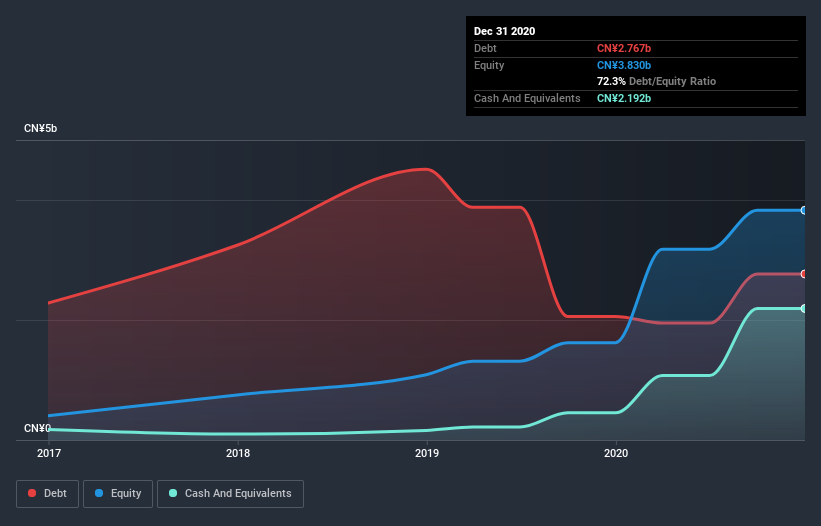The external fund manager backed by Berkshire Hathaway's Charlie Munger, Li Lu, makes no bones about it when he says 'The biggest investment risk is not the volatility of prices, but whether you will suffer a permanent loss of capital.' So it seems the smart money knows that debt - which is usually involved in bankruptcies - is a very important factor, when you assess how risky a company is. We note that Huijing Holdings Company Limited (HKG:9968) does have debt on its balance sheet. But the more important question is: how much risk is that debt creating?
When Is Debt Dangerous?
Generally speaking, debt only becomes a real problem when a company can't easily pay it off, either by raising capital or with its own cash flow. If things get really bad, the lenders can take control of the business. However, a more common (but still painful) scenario is that it has to raise new equity capital at a low price, thus permanently diluting shareholders. Of course, debt can be an important tool in businesses, particularly capital heavy businesses. The first step when considering a company's debt levels is to consider its cash and debt together.
See our latest analysis for Huijing Holdings
What Is Huijing Holdings's Net Debt?
As you can see below, at the end of December 2020, Huijing Holdings had CN¥2.77b of debt, up from CN¥2.06b a year ago. Click the image for more detail. However, because it has a cash reserve of CN¥2.19b, its net debt is less, at about CN¥575.8m.

A Look At Huijing Holdings' Liabilities
We can see from the most recent balance sheet that Huijing Holdings had liabilities of CN¥7.72b falling due within a year, and liabilities of CN¥1.19b due beyond that. Offsetting these obligations, it had cash of CN¥2.19b as well as receivables valued at CN¥314.9m due within 12 months. So its liabilities total CN¥6.40b more than the combination of its cash and short-term receivables.
This deficit is considerable relative to its market capitalization of CN¥8.47b, so it does suggest shareholders should keep an eye on Huijing Holdings' use of debt. This suggests shareholders would be heavily diluted if the company needed to shore up its balance sheet in a hurry.
In order to size up a company's debt relative to its earnings, we calculate its net debt divided by its earnings before interest, tax, depreciation, and amortization (EBITDA) and its earnings before interest and tax (EBIT) divided by its interest expense (its interest cover). This way, we consider both the absolute quantum of the debt, as well as the interest rates paid on it.
Huijing Holdings has a low net debt to EBITDA ratio of only 0.53. And its EBIT easily covers its interest expense, being 11.4 times the size. So we're pretty relaxed about its super-conservative use of debt. But the bad news is that Huijing Holdings has seen its EBIT plunge 16% in the last twelve months. We think hat kind of performance, if repeated frequently, could well lead to difficulties for the stock. The balance sheet is clearly the area to focus on when you are analysing debt. But it is Huijing Holdings's earnings that will influence how the balance sheet holds up in the future. So if you're keen to discover more about its earnings, it might be worth checking out this graph of its long term earnings trend.
Finally, a business needs free cash flow to pay off debt; accounting profits just don't cut it. So we always check how much of that EBIT is translated into free cash flow. In the last three years, Huijing Holdings's free cash flow amounted to 37% of its EBIT, less than we'd expect. That weak cash conversion makes it more difficult to handle indebtedness.
Our View
While Huijing Holdings's EBIT growth rate has us nervous. For example, its interest cover and net debt to EBITDA give us some confidence in its ability to manage its debt. Taking the abovementioned factors together we do think Huijing Holdings's debt poses some risks to the business. While that debt can boost returns, we think the company has enough leverage now. When analysing debt levels, the balance sheet is the obvious place to start. However, not all investment risk resides within the balance sheet - far from it. We've identified 3 warning signs with Huijing Holdings , and understanding them should be part of your investment process.
Of course, if you're the type of investor who prefers buying stocks without the burden of debt, then don't hesitate to discover our exclusive list of net cash growth stocks, today.
If you’re looking to trade Huijing Holdings, open an account with the lowest-cost* platform trusted by professionals, Interactive Brokers. Their clients from over 200 countries and territories trade stocks, options, futures, forex, bonds and funds worldwide from a single integrated account. Promoted
Valuation is complex, but we're here to simplify it.
Discover if Huijing Holdings might be undervalued or overvalued with our detailed analysis, featuring fair value estimates, potential risks, dividends, insider trades, and its financial condition.
Access Free AnalysisThis article by Simply Wall St is general in nature. It does not constitute a recommendation to buy or sell any stock, and does not take account of your objectives, or your financial situation. We aim to bring you long-term focused analysis driven by fundamental data. Note that our analysis may not factor in the latest price-sensitive company announcements or qualitative material. Simply Wall St has no position in any stocks mentioned.
*Interactive Brokers Rated Lowest Cost Broker by StockBrokers.com Annual Online Review 2020
Have feedback on this article? Concerned about the content? Get in touch with us directly. Alternatively, email editorial-team (at) simplywallst.com.
About SEHK:9968
Huijing Holdings
An investment holding company, engages in the property development and investment activities in the People’s Republic of China.
Moderate risk and slightly overvalued.
Similar Companies
Market Insights
Community Narratives



